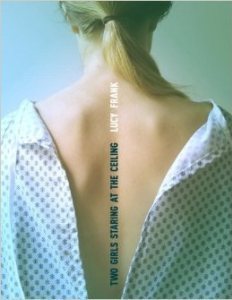Review: TWO GIRLS STARING AT THE CEILING by Lucy Frank
I’ve long been a fan of novels in verse, and this new verse novel by Lucy Frank comes with a twist. TWO GIRLS STARING AT THE CEILING is the story of Chess, who is hospitalized the night after what should have been a high-school-movie-esque-party-turned-romance. But everything went impossibly wrong, and now she’s sharing a room with a sad old lady and one of the angriest girls she’s ever met. Chess’ room mate Shannon has a story to tell, too. And her no bullshit way of thinking — and talking — is crossing the curtain that divides their living space in the hospital. Here’s the twist: In this novel, the aforementioned curtain is represented by a line down the page. Each girl has her own space, her thoughts and her dialogue on whichever side of the curtain she happens to be standing. It could be considered nothing more than a clever gimmick, but the story is strong enough to power past this label.

Schwartz & Wade, August 2014.
Chess is so embarrassed by her evening gone awry. And when she finally comes out of her meds-induced delirium, finding herself parked in a hospital room, she pretty much wishes she could just disappear. Chess never wants to see her crush again, and doesn’t even want her friends to visit. (A bestie’s brand new dress was ruined in the mortifying incident that landed her in the ER.) And she definitely doesn’t want anyone to know her diagnosis: Chron’s disease. Known also by it’s way less appealing (and much more humiliating) name, inflammatory bowel disease.
The thing is, Shannon isn’t going to let her wallow. Shannon has been through what Chess is dealing with, and she’s not going to pull any punches when it comes to giving unsolicited advice, going hard on the hospital staff, or asking for exactly what she wants. Chess is a please-and-thank-you sort of girl. But maybe there’s something she can learn from her bristly room mate. Her diagnosis — something she’s been trying to avoid, ignoring the pain, telling herself that every incident has been a coincidence — is terrifying. But maybe, with Shannon at her side, she can find the strength (despite the “evil juice” that is her medication) to face the rest of her life.
For fans of Sonya Sones and Wendy Mass, this is the type of book that sticks with you, opening up the world of an underrepresented illness and creating characters that are not only in the story but in your heart. Reluctant readers will love the unusual style and format, and verse novel lovers will gobble this one up as well. Get it on your shelves for fall!









